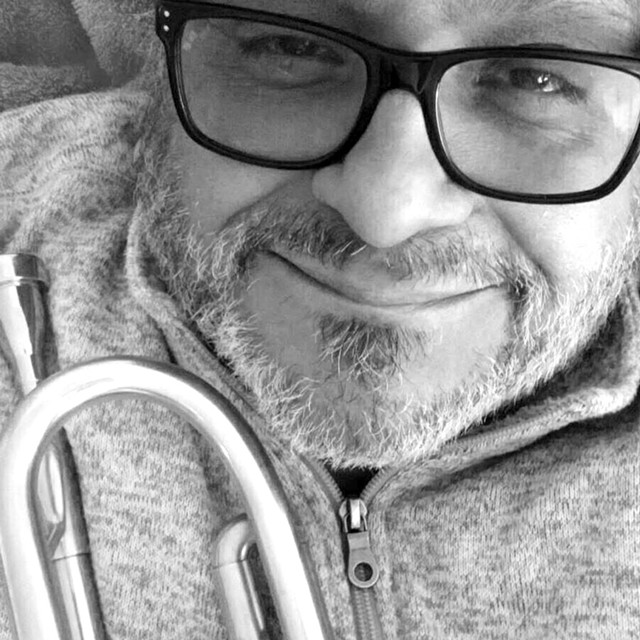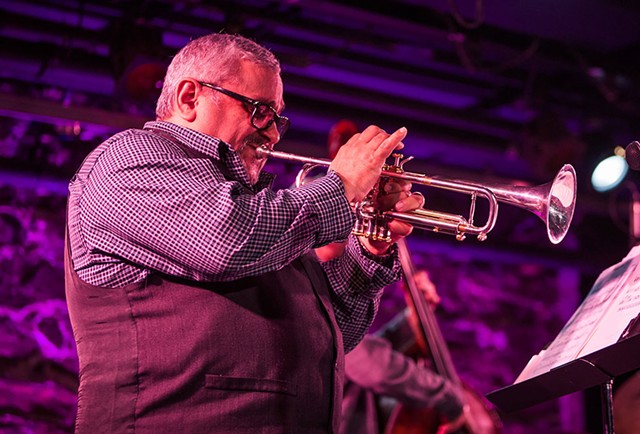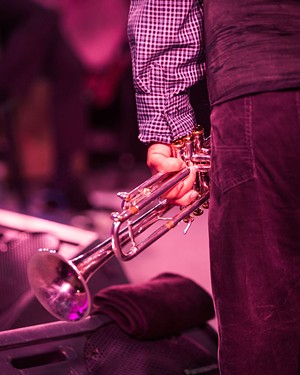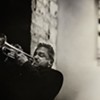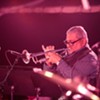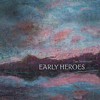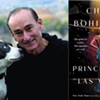Switch to the mobile version of this page.
Vermont's Independent Voice
- News
- Arts+Culture
- Home+Design
- Food
- Cannabis
- Music
- On Screen
- Events
- Jobs
- Obituaries
- Classifieds
- Personals
Browse News
Departments
Browse Arts + Culture
View All
local resources
Browse Food + Drink
View All
Browse Cannabis
View All
-
Culture

'Cannasations' Podcaster Kris Brown Aims to 'Humanize'…
-
True 802

A Burlington Cannabis Shop Plans to Host…
-
Business

Judge Tosses Burlington Cannabiz Owner's Lawsuit
-
Health + Fitness

Vermont's Cannabis Nurse Hotline Answers Health Questions…
-
Business

Waterbury Couple Buy Rare Vermont Cannabis License
Browse Music
View All
Browse On Screen
Browse Events
View All
Quick Links
Browse Classifieds
Browse Personals
-

If you're looking for "I Spys," dating or LTRs, this is your scene.
View Profiles
Special Reports
Pubs+More
Onstage and On-Air, Trumpeter Ray Vega Sets the Groove
Published May 30, 2018 at 10:00 a.m. | Updated June 1, 2021 at 5:54 p.m.
If you happen to walk down Burlington's Cherry Street on a Wednesday night, you may feel a magnetic pull toward Hotel Vermont. Breezy strains of Latin jazz trickle out of the boutique hotel's lobby, tantalizing passersby. Through the glass doors, you'll find a diverse crowd of eager jazz-heads soaking up the hot sounds of swing, mambo and whatever else Ray Vega has on the evening's musical menu.
On a typical evening, the crowd is full of young professional types, empty nesters on date night, seniors — both the white-haired and college-age varietals — and folks who come to dance. Even the hotel staff can't help but bust a few moves from behind their stations at guest check-in as Vega and company blast out the tunes. Crowds frequently spill out of the chic corner lounge area with its low, mod seating to the stairs leading up to in-house restaurant Juniper, and even across the expansive lobby.
Attendees watch Vega, 57, and his combo with rapt attention. Stumble upon the group mid-song and you might not know who's leading. Vega sits in a chair on the sidelines and doesn't micromanage. With an easygoing, imperceptible internal rhythm, he and his players volley improvised solos within works by jazz greats such as Wayne Shorter and John Coltrane. But the majority of tunes played are the trumpeter's originals.
Vega doesn't bother with excessive crowd work — at least, not during the set. Once it concludes, he weaves his way through the audience, shaking hands, ribbing friends and greeting a sea of familiar faces. He moves with the charm and grace of an ambassador, which, in the local jazz scene, is precisely his role.
Over the last five years, his residency at Hotel Vermont has become one of the most distinguished in the area, in any genre. That's in large part due to Vega, who curates the weekly event. Even on nights he can't perform himself, he books many of the region's best and brightest players. However, though short in stature, Vega stands taller than all of them in musical legacy.
The leader of several combos in Burlington, Vega is a world-renowned trumpeter and bandleader. He currently serves as a senior lecturer in the University of Vermont's Department of Music and Dance, where he teaches jazz history and trumpet and oversees several ensembles.
Vega recently landed a new gig: host of Vermont Public Radio's "Friday Night Jazz" program. Whoever holds that venerated position is regarded locally as not just a disc jockey but an important authority on all things jazz.
Like previous hosts George Thomas and, most recently, Reuben Jackson, Vega brings a wealth of jazz knowledge to the mic. Unlike those men, Vega, who debuted on VPR in mid-May, is a scholar and a musician. He brings a lifetime of experience as a performer on some of the grandest stages in the world. Most notable among his voluminous credits, Vega was a member of bands led by three of the most famous Latin-jazz musicians of all time: Mongo Santamaría, Ray Barretto and Tito Puente.
In his various roles as educator, bandleader, family man and now radio host, Vega is more concerned with taking care of those around him and fostering a vibrant scene than with promoting himself. His humility allows his students and associates to thrive.
"One of the things that [blows] me away [is] that, semester after semester, he takes [on] student groups that maybe have a lot of weaknesses as well as strengths," says professor Alex Stewart, who founded UVM's jazz program. "By the end of the semester, they invariably sound great," he continues. "He makes them groove and play together in a really coherent fashion."
This week, Vega is in his element as the annual Burlington Discover Jazz Festival kicks off. He performs several sets, including a tribute to John Coltrane on Thursday, June 7, at Juniper. He'll also host a meet-the-artist session with trumpeter Christian Scott aTunde Adjuah on Sunday, June 3, at the FlynnSpace.
The South Bronx native speaks with a brusque yet sportive accent that instantly gives away his regional origins. For emphasis, he sometimes plays it up with a self-aware cheekiness. At its most pronounced, his affectation lands somewhere between character actor Richard Kind and Broadway legend Harvey Fierstein.
When not performing, Vega dresses unassumingly in plain clothes — though he has a fondness for novelty. He frequently sports a black baseball cap that reads "Bebop" and a T-shirt with the following passage: "It was in the syllabus, it's still in the syllabus, it's always in the syllabus."
"I'm not a shy person," says Vega in an interview at UVM's Dudley H. Davis Center.
His whimsical tee hints at his teaching style: firm yet fun.
"He kind of does standup comedy," says Vega's UVM colleague Clare Byrne, who's also a senior lecturer in the Department of Music and Dance. "That's not to take anything away from how incredibly knowledgeable he is," she adds. "He could tell anecdotes about every single person he's talking about, because he's met and played with them."
Undoubtedly, those anecdotes will come in just as handy in the radio booth as they have in the classroom. And Byrne suggests another trait that should serve Vega as well on air as it has onstage: star quality.
Byrne and Vega met at a party thrown by UVM Department of Music and Dance then-chair Tom Toner for new faculty in the fall of 2008, when both began their tenures at the school. Of that meeting she says, "It was very clear that Ray was a star."
A Bronx Tale
The youngest of five brothers, Vega was born in 1961 to first-generation Puerto Ricans in New York City. His father worked as a waiter at a high-end Manhattan steak house, while his mother worked as a seamstress for a brief period.
"It was a different time," Vega notes. "You can't work on those kind of salaries today, not with five sons."
He describes his Bronx neighborhood as working class.
"Back then, the projects were a place that people who were living in tenement houses went to as an upgrade," Vega recalls. He remembers his building as full of hardworking families — only a few of which, he says, were on public assistance. Despite problems in the neighborhood — poverty-related crime, gang activity, etc. — they never crossed his home's threshold. Vega says he wanted for nothing while growing up.
"We were living in kind of a bubble," he says. "We knew the area had its challenges, but when you walked into my house, you were in an oasis."
In 1973, Vega took the first steps on his musical journey. After transferring to a new junior high school midway through seventh grade, he joined the band.
"I wanted to play the saxophone, but all they had were trumpets and trombones," he says. He chose to play trumpet since his family already had one in the house — though no one at home was a serious player.
A year later, Vega auditioned for the High School of Music & Art in Manhattan with a rendition of "The Star-Spangled Banner."
"I was terrible," he admits. "There was no reason I should've been accepted — but I think my grades got me in."
Vega describes his high school as a welcoming, neutral playing field, where students from all backgrounds, races and socioeconomic classes commingled.
"When we walked into those classes, we were all even," he says.
Under the tutelage of renowned jazz educator Justin DiCioccio, who founded the school's jazz program, Vega and his peers explored everything from brass bands to classical orchestra music.
Fun fact: The school's sister institution, the School of Performing Arts, was the setting for the 1980 teen drama film Fame. The two schools officially merged in 1984 to form what's now known as Fiorello H. LaGuardia High School of Music & Art and Performing Arts. Vega graduated in 1979, a year before the film came out, making it highly likely that inspiration for the film's characters came from Vega's peers.
After a brief stint at Long Island University, Vega dropped out and began working in a Japanese restaurant — mostly dish washing and plating. Following that, he landed a job at the Bankers Trust of New York, first in the mail room and then at a desk facilitating the buying and selling of stocks. Around the same time, Vega married his wife, Cookie.
"During the time I was at the bank, she knew that I was unhappy," he says. "I was working my day job [and] grabbing little salsa, R&B and jazz gigs on the weekend."
In January 1985, Vega tendered his resignation to pursue playing music full time. He also taught music lessons on the side and, in the late '80s, briefly served as an assistant teacher in a Jewish preschool.
Though he sometimes served as bandleader, Vega describes the kinds of gigs he was getting at the time as "the trenches." But then he scored a huge opportunity: In 1987, famed Afro-Cuban percussionist and bandleader Mongo Santamaría asked Vega to sub in his band.
Says Vega, "That was a big turning point from playing salsa clubs to traveling and going on the road."
Movin' On Up
Vega's career intensified further when was offered a permanent spot in Tito Puente's band. He began his run with the Latin jazz percussionist and bandleader on Vega's 32nd birthday in 1993.
"Tito knew me from Mongo Santamaría's band," ex-plains Vega, who had also subbed with Puente's group on and off for several years prior. The two bands would frequently gig on the same nights at the Blue Note Jazz Club in NYC. Puente passed away in 2000; Santamaría in 2003.
"It was rough," says Vega of the rigors of touring with Puente, who, like Vega, was born in NYC to Puerto Rico-born parents. "You fly out Friday, do Saturday [and] Sunday in LA, fly back Monday, play Monday night," Vega recalls. "[But] two years later, I was buying a house."
By his own assessment, he had a reputation for being a world-class cutup.
"I would always be joking around with Tito," Vega says. "We went out on our first trip. We were in New Bedford, Mass. I go up to my room. I put on the TV and, all of a sudden, I get a call from downstairs. [Our manager] tells me, 'Hey, man, Tito wants you to get your ass down here right now. He needs to hear some jokes.' That was, like, my initiation."
Another significant artist Vega played with was Ray Barretto. Through that relationship — and also through playing on Puente's 1996 record Special Delivery — Vega became acquainted with some folks at Concord Records. In 1996, the label released his eponymous debut. Vega made one more album with Concord, Boperation, followed by a string of others on labels Palmetto Records and Origin Records from the late '90s into the early 2010s. Vega plans to release another record later this year, likely independently.
"Barretto probably had the biggest impact on me as an artist," says Vega of the late drummer and bandleader. "Tito's band was a job. It was about making [his] music great. It wasn't about Ray Vega shining under Tito Puente. And that was OK. I didn't have a problem with that. That's what it was [like] in most of these Latin bands I was playing with.
"Barretto gave me a lot of leeway," he continues. "I wrote for Mongo, but I was writing for his band. For Barretto, I could write however I wanted to write."
You can hear that liberation in Vega's squiggly, muted trumpet in the first few seconds of "New World Spirit," the opening track on Barretto's 1993 album Ancestral Messages.
Vega reckons he wasn't the best trumpet player for the job when he began scoring spots in these high-profile bands. But he thinks his attitude and work ethic made him stand out.
"My thing was: Show up on time, do your best, have the best attitude possible, don't lose sight of why you're doing it," he says.
That's not to say Vega's relationships with his mentors were all sunshine and rainbows.
"I would get into arguments," he says. "Even with Ray, who gave me the most opportunities, I wasn't as good as I could've been."
Vega says that as one of the preeminent on-call players in his genre, his rising stock went to his head.
"When you're young, you don't realize what you [have]," he says. "You wanna get into spats about money. You start to bang your chest a little bit."
Vega says he feels lucky that he and Barretto were able to move past their rift before the latter's passing in 2006 — though he chooses to keep the details private.
"We later on forgave each other, and he became one of my best friends," Vega says.
Elements of Style
While learning from and playing with the masters, Vega was simultaneously leading smaller bands and combos — and passing his knowledge on to others.
Willie Martinez, a NYC-based percussionist and drummer whom Vega met when they were both young, became a mainstay of Vega's quintet about 18 years ago.
"I learned a lot from Ray about leading a group," says Martinez, who currently leads La Familia Sextet. "Ray lets his musicians be onstage. He doesn't make a lot of suggestions [or] give a lot of notes. He lets everybody experience the music in their own way."
Brian McCarthy, a saxophonist who teaches at Saint Michael's College and plays in the Ray Vega Latin Jazz Sextet, uses a sports analogy to describe his bandleader.
"He kind of has a game plan," says McCarthy. "Like a quarterback, he'll call audibles. He's reading the audience. He knows what the energy is like, what types of tunes are getting a good response, or even from the musicians that night."
(Another fun fact: Vega and McCarthy first encountered each other when the latter was matriculating at William Paterson University in 2000 — though Vega, then a visiting lecturer, doesn't specifically recall McCarthy from the sea of young faces.)
Martinez concurs with McCarthy's assessment of Vega onstage.
"When he puts his thing into motion, you just follow along," Martinez says. "He has a way of guiding you to the promised land without talking about it too much."
In 2002, Vega landed his first collegiate position at the Conservatory of Music at the State University of New York at Purchase, despite not having a college degree himself. But his reputation, skills and experience proved commensurate to a terminal degree. Vega taught trumpet and jazz history and led the Purchase Latin Jazz Orchestra — a lineup similar to his current course load at UVM.
David DeJesus, a NYC-based saxophonist and one of Vega's students during his first year of teaching, now conducts the Purchase Latin Jazz Orchestra. He also leads the Birdland Big Band at Birdland, the renowned NYC nightclub, as well as his own smaller group, Drive, among others.
"Ray brought me up," says DeJesus. "He taught me how to act like a professional and take mature solos and the etiquette of being in a band.
"In a classroom setting, Ray treats his students like professionals," continues DeJesus. "He expects the music to be played perfectly and gives you a hard time if you don't do that."
Universally, Vega's cohorts past and present praise his work ethic and general likability.
"He gets along with everybody," says DeJesus. "He finds a way to connect with everybody. He doesn't create drama. I've been in some bands where that's not always the case."
Greener Pastures
In 2004, Vega spent his first summer at the FlynnArts Summertime Jazz camp. The intensive is open to middle school students and older, though most of the participants are high schoolers. UVM's Stewart developed and co-taught the camp with professor Rick Davies of SUNY Plattsburgh. (Davies passed away in 2015.)
"Rick played trombone, and I played saxophone," says Stewart. "What we really needed was a trumpet player. I didn't want to bring in another academic. I wanted a real performer."
At Davies' suggestion, they called up Vega; he would return to the camp for subsequent summers, as well. Meanwhile, Stewart was lobbying to add another full-time faculty member to UVM's jazz program. By the spring of 2008, he had secured a spot for Vega.
"At that point in my life, the best gigs I was getting were all about going to an airport anyway," Vega says. "I said, 'At this point, I could be living anywhere.'"
So Vega, his wife and three kids made the move, settling in South Burlington. The transition wasn't exactly seamless.
"When you're used to a certain pace — the New York pace — [Vermont] is really different," Vega observes. "But now I like this pace. I don't care for the New York pace anymore. You can keep that."
Almost immediately, Vega developed associations with a number of players in local jazz, including UVM affiliate artist and pianist Tom Cleary.
"In terms of Latin music, [Vega brings] a real connection to the great tradition of Latin jazz," Cleary says. "[The Vermont community] never had anybody who played with Tito Puente and Ray Barretto and Mongo Santamaría."
Vega's first weekly shindig was at downtown Burlington coffee shop Muddy Waters. On Wednesday nights from about 2009 through 2011, jazz fans enjoyed programming much like what Vega and company present now at Hotel Vermont. It was at the Muddy Waters residency that local audiences and players began to learn exactly who had just arrived in town. They also learned about his idiosyncrasies.
"One of the biggest complaints I had [when I first moved to Vermont] was that everything started late," Vega says. "If you're telling your audience that your show starts at eight o'clock, you shouldn't be showing up at eight."
But his prickly attitude didn't last long.
"I will admit that I was a hard-ass in many ways," says Vega, noting his lack of patience for players who didn't meet his professional standards. "I had to cool myself off."
Another tricky thing for him after the move: Like many native New Yorkers, Vega never learned how to drive. Upon moving to Vermont, the trumpeter thought he would finally get behind the wheel. Yet, after 10 years of Champlain Valley living, he still primarily takes public transportation to get from here to there.
Further cementing Vega's passenger-only status is his recent struggle with vertigo. The symptoms he calls "centrifuge-like" mean that he'll continue to rely on buses, cabs and his own two feet for the foreseeable future.
Health problems have plagued other members of his family, too. Most notably, the trumpeter had to take a leave of absence from the Muddy Waters residency to devote more time to his son, Aaron, who had been diagnosed with cancer years earlier. Aaron now has a clean bill of health, thanks to his family's tireless efforts to find him the best care, locally and across the country.
Despite these problems, Vega has found ways to stay positive and upbeat.
"Whenever he sees me, he starts dancing, which is just awesome," says Byrne. "He's always asking me to put him in my dance pieces."
"He's got that rare combination of being an incredible musician and a great communicator," says Cleary, likening Vega's "effervescent personality" to that of legendary trumpeters such as Louis Armstrong and Dizzy Gillespie.
Mic Check
In November 2017, VPR announced that Reuben Jackson would be leaving his post as the host of the station's "Friday Night Jazz" program the following spring. The immediate question on the minds of local jazz fans was: Who can possibly succeed him? Many loved Jackson's poetic musings and killer selections. However, Jackson professes to be a huge Vega fan and was pleased when the station announced, earlier this month, that the trumpeter would replace him.
"I could not have been happier," Jackson says. "He knows the music, which is obviously important. But the warmth and the range he's already brought to programming — the music's in good hands."
While the new host has plenty of experience in recording studios and has sat in the guest chair in broadcast situations, he's never been the one running the show. He opened his inaugural broadcast on Friday, May 18, with Dexter Gordon's 1977 cut "Fried Bananas." After a short greeting, he segued into Puente's "Dias en el Palladium."
Vega gave over most of his airtime to the music itself, offering quick introductions and recaps of his selections. But by the third hour of the program, he seemed to open up a bit, adding more of his colorful inflections and big personality.
A veritable encyclopedia of jazz facts and history — as you'd expect from an expert on the subject — Vega feels confident he'll be able to "speak about great jazz artists without any notes."
When he was host, Jackson programmed the show with a two-pronged approach.
"Friday night can mean one of two things," says Jackson. "It's either the workweek is over [and] you're wiped out, or it's Friday and let's party. I think that [Vega's] selections touched upon that whether it was conscious or not. It felt like Friday."
Vega has high standards for what he'll play on the show.
"I told [VPR] I wouldn't do it if I'm going to be dictated what I have to play," he explains. "The issue with jazz right now is that — since there are [hardly any] record labels — every Tom, Dick and Harry [can] get a GoFundMe account and hire a publicist. What's going to happen is that somebody with a nominal amount of talent is going to be on the same playing field as everybody else. And that's a tough thing for the art."
While an overabundance of music might make gatekeepers and tastemakers such as Vega more important than ever for discerning listeners, it also creates a distinct challenge.
"Programming is harder than people think," Jackson says. "It's like you're picking an all-star team every week."
As for how Vega will choose his musical all-stars, he's keeping his rubric relatively simple.
"The roux that ties this meal together is going to be swing and groove," he says. He'll also vary his programming to cater to some listener requests, provided they meet one paramount criterion: "It's gotta have a pulse," says Vega. "I'm all about movement."
The original print version of this article was headlined "In the Swing"
Ray Vega performs multiples times during the Burlington Discover Jazz festival, which runs Friday, June 1, through Sunday, June 10. Visit discoverjazz.com for a full schedule.
"Friday Night Jazz" airs Fridays, 8 to 11 p.m., on Vermont Public Radio and at vpr.net.
Related Stories
Got something to say?
Send a letter to the editor
and we'll publish your feedback in print!
Tags: Music Feature, Ray Vega, Friday Night Jazz, VPR, trumpet, jazz, Video
More By This Author
About The Author

Jordan Adams
Bio:
Jordan Adams joined Seven Days as music editor in 2016. In 2021, he became an arts and culture staff writer. He's won awards from the Vermont Press Association and the New England Newspaper and Press Association. In 2022, he became a freelance contributor.
Jordan Adams joined Seven Days as music editor in 2016. In 2021, he became an arts and culture staff writer. He's won awards from the Vermont Press Association and the New England Newspaper and Press Association. In 2022, he became a freelance contributor.
Speaking of...
-

On the Beat: Vermont Venues Start Their Long Cleanup, and the Maple Roots Festival Returns
Jul 19, 2023 -

On the Beat: Neil Cleary Celebrates the Talking Heads and New Music From Madaila
Jun 28, 2023 -

On the Beat: Foam Throws a Birthday Party, Jazz at the Brass Lantern
Apr 26, 2023 -

Talking With Stephen Jay Goldberg About His New Book, 'Rants Raves & Ricochets'
Aug 17, 2022 -

Soundbites: Make Music Day in Vermont, Rockin' Ron's Library Tour, and Saving Grace Beef With Lil Xan
Jun 8, 2022 - More »
Comments
Showing 1-1 of 1
Comments are closed.
From 2014-2020, Seven Days allowed readers to comment on all stories posted on our website. While we've appreciated the suggestions and insights, right now Seven Days is prioritizing our core mission — producing high-quality, responsible local journalism — over moderating online debates between readers.
To criticize, correct or praise our reporting, please send us a letter to the editor or send us a tip. We’ll check it out and report the results.
Online comments may return when we have better tech tools for managing them. Thanks for reading.
- 1. On the Beat: maari Drops 'Eyes Wide Shut,' and a Farewell Show for Pete Sutherland Music News + Views
- 2. Soundbites: Umphrey's McGee Loves Burlington Music News + Views
- 3. Frankie White, 'brain dead' Album Review
- 4. Community Garden, 'Me vs Me' Album Review
- 5. River City Rebels, 'Pop Culture Baby' Album Review
- 6. Soundbites: Feeling It All With Phil Cohen Music News + Views
- 7. Soundbites: Trouble & Together at the Flynn Music News + Views
- 1. Lily Seabird, 'Alas,' Album Review
- 2. Legendary Vermont Saxophonist Joe Moore Dies Music News + Views
- 3. Soundbites: Trouble & Together at the Flynn Music News + Views
- 4. Soundbites: Surf's Up With TEKE::TEKE Music News + Views





























